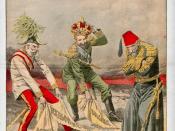On the 3rd August 1914, Germany invaded Belgium and declared war on France; Britain then declared war on Germany. The First World War had begun, and by the end of it would leave millions dead and would have reshaped the world. Although the event that set off the war was the assassination of the Austrian emperor Franz Ferdinand in Sarajevo, historians argue that there are many other underlying long term causes that led up to this event. Germany has been held responsible time and again- the official report written by the victorious powers just after the war claimed that 'the war was premeditated by Germany, who committed acts which made it unavoidable and it worked to defeat all the proposals made to avoid war'. However, as time wore on, historians began to study long term causes and realized that there are numerous other factors that must be taken into account before Germany's guilt can be assessed.
The rise of Germany in the years prior to the war, and its behavior in the crisis just before it, was an issue which created much tension between European powers. It was rapidly becoming stronger, with more military, economic and industrial resources and other major powers worried how it would behave in this new superior position. Bismarck's foreign policy during this time also contributed to the tension as it seemed he was not being loyal to any particular alliance; instead, Germany had many different conflicting options to give itself maximum flexibility, which led to its partners distrusting it. Kaiser Wilhelm's policy of Weltpolitik claimed that a 'vast colonial empire was required, with a large navy to support it' because Germany's industrial expansion was so dependent on imports of raw materials from overseas. This policy increased jingoism and made antagonism grow up in between countries,


